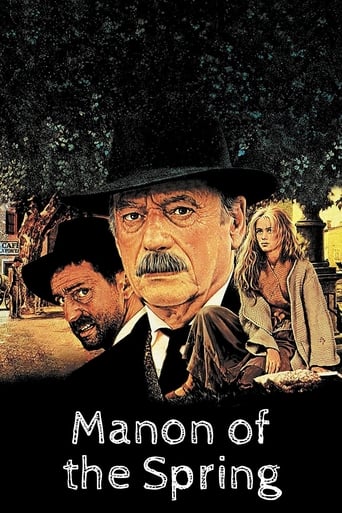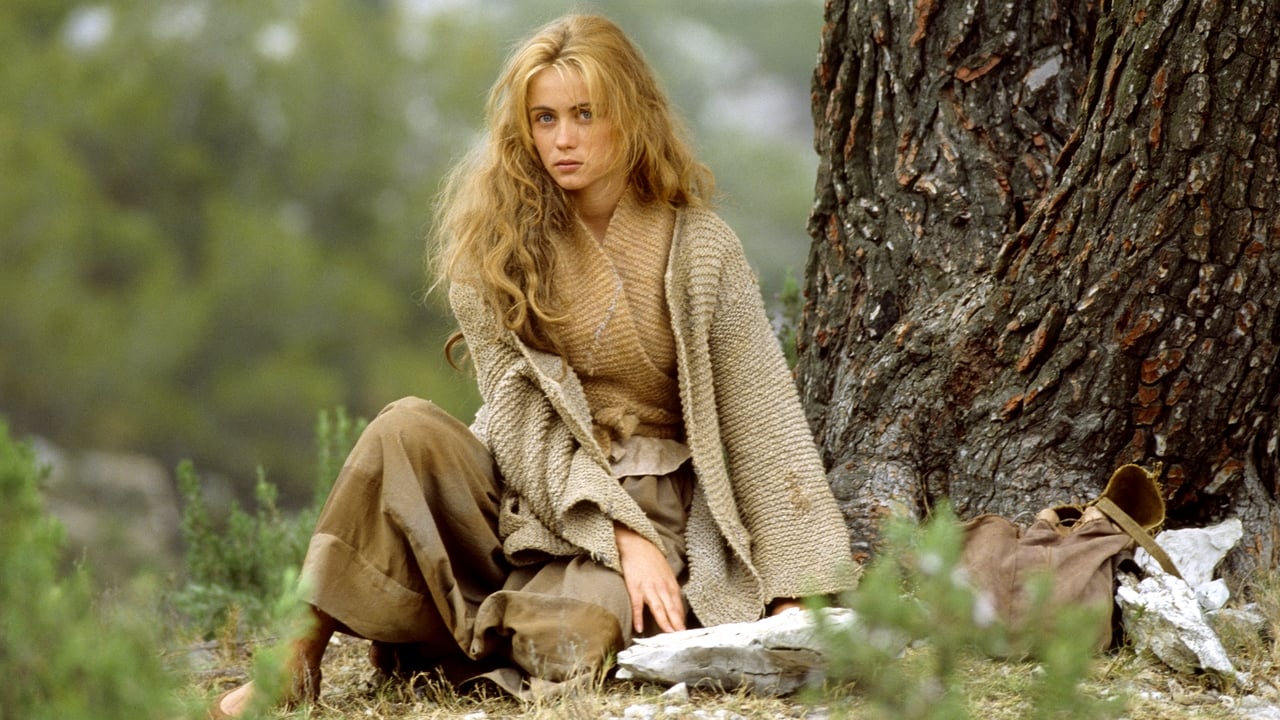ElMaruecan82
In my previous review of "Jean de Florette", I mentioned the movie "Chinatown". Well, there's a moment in "Manon of the Spring" where a city council is reunited to discuss the emergency of the recent shortage of water and through the anger and desperate frustration displayed by the farmers, I was reminded of the scene where Nicholson was amusingly looking at the sheep invading the L.A council and farmers protested about the absence of water. Watching Berri's movies before "Chinatown" would be recommended if only to give you the idea of how water is precious
which makes Manon's vengeance even more delicious.Indeed, I expected the beautiful Emmanuelle Béart as the titular goat shepherdess to avenge the death of her father, whose hard work and gentleness was destroyed by the cruel stratagem of an evil Noah-Cross like old man constantly hiding behind the trees while his nephew was doing the dirty job, I got the taste of that vengeance but I didn't expect it to be as emotionally rewarding as what the final act had to offer. This is not just a credit to Marcel Pagnol, the author but of Claude Berri, the storyteller, who trusts enough his material not to try to make it more spectacular than what it is. When you have a good story, there's no need for artifices.After watching the first opus, Ugolin (Daniel Auteuil) and César (Yves Montand) were all familiar faces, we know the extremes they reached to get the land and grow their carnation, the film opens with these flowers as red as the blood it cost to make that miraculous little possible. But for César, the land was worth a life, because Jean wasn't his blood, he was an outsider. As simple as that, and when the film opens, he approaches his nephew with the same question that in the first film's opening, he tells him it's time to think of having children, it's like a sort of "now, where were we?", after having plotting to the point of death, let's think of life a little.César explains that the Soubeyrans have worked hard enough to make money, the lineage must go on to make sure there's always a heir, without one, even land loses its value, Jean's death becomes pointless. But we know we're in a Greek tragedy format so no evil can be redeemed and when Ugolin crosses the path of Manon and instantly falls in love with her, he doesn't know It yet, but the punishment has started. Convinced that she doesn't know about their secret, he starts a courting session, harboring a ridiculous hunter's outfit to impress her and in one of the movies' most powerful scenes, starts a small smooth talk that escalates (literally) through a chase and where, finally, out of breath, he ends up declaring his flame, as he has nothing else to provide, except his good fortune.We have a taste of Karma with this infatuation but the best is yet to come when Manon accidentally eavesdrop a discussion between two villagers who admit that they knew about the spring and didn't help Jean because it was none of their business, and later, she discovers the spring that feeds all the village and stops it, not only Ugolin and his flowers, but the whole town is punished by Manon. That will be their business after all. And when Ugolin takes his mule to go fetch the water, and is obviously exhausted by the heavy barrels, we think of Jean who went through the same nightmare, when all it took was to have a few words. Whoever killed by the water will perish by the water; this is a great tale of vengeance not because the culprits are punished but because they're punished the right way.The performances of the actors are integral to the film's success, Emmanuelle Béart says a lot without speaking, her eyes are like repressing all the feelings until the final implosion held behind her blond, fiery, almost leonine hair, Auteuil as Ugolin gives a dimension of pathos that goes beyond his ungrateful looks and becomes the collateral but acceptable victim of his uncle's malice. But the best is still from Montand, who as the patriarch, looks like a stubborn man still recluse behind the fortress of his own vileness until a final last revelation comes as the perfect vengeance and the best thing about it is that it doesn't even come from Manon, but life itself which establishes the total failure of all his projects, and he lived long enough to measure up the extent of his cruelty and that's how poetically justice worked, when someone is so cruel he only gets sympathy as his cruelty's victim.Marcel Pagnol was born the same day than Cinema and not very far from La Ciotat where the train made its iconic entrance, it's like he had this gift for authentically depicting human nature, reminding me this quote from Ebert: the more specific the story is, the more universal it becomes because the more it understands the characters, the better we do. That's the power of Pagnol, Berri and the actors, they created so specific characters that they immediately became real, this is high adult drama about things that happen in real life. Even someone who doesn't know much about farming, about water and love will get the many messages about love, greed, bigotry and karma.This is tale for the ages, and one of the greatest French movies that earned its commercial and critical success. I couldn't believe I waited so much time to finally see this masterwork, one that says as much about mother nature than human nature and shows that at least, mother nature played fair with men, only they underestimated how evil and greedy they could be, and how destiny could give them a taste of their own medicine.
Luigi Di Pilla
This part two sticks dramatically to the first one. The wonderful girl Emmanuelle Béart delivered an interesting performance. Yves Montand did a great job here showing all the repertoire of this psychological character profile. He was really a great actor, chapeau. But Daniel Auteuil was also very credibly in this role until the end. Bravo. Finally, Claude Berri directed again like a master. Thank you for these two very nice films. Don't expect a fast paced story because it has a slow but surprising countdown. For all that likes the surroundings South of France this is a rich experience to not miss. See also the other highlight La Fille du Pusatier from the same writer Marcel Pagnol. Vote: 8/10.
Sindre Kaspersen
French actor, producer, screenwriter and director Claude Berri's thirteenth feature film which he co-wrote with French screenwriter Gèrard Brach (1927-2006) is an adaptation of a novel, "L'Eau des Collines - Jean de Florette and Manon des Sources" (1964) by French author, playwright and filmmaker Marcel Pagnol (1895-1974), which was inspired by true events. It was shot on numerous locations in the Vaucluse department of Provence in the southeast of France and is part of a duo logy which was preceded by "Jean De Florette" (1986). It tells the story about Manon Cadoret who still lives in the highlands of Provence ten years after her and her mother Aimeé had to sell their property to Cesar Le Papet Soubeyran and his nephew Ugolin Soubeyran. Manon has become a shepherd girl and lives a quiet life, but when she one summer day encounters Ugolin who now is a successful farmer, bad memories are awakened. Struck by the now grown up Manon who he has not seen since she was a little girl, Ugolin falls head over heels in love with her. But Manon still remembers what he and his uncle did to her family, and she has found a way to reveal their secret.Like the first part of this epic story, this continuation is subtly and acutely directed by French filmmaker Claude Berri (1934-2009) and with it's ardent milieu depictions and efficient narrative structure, it draws an incessantly engaging portrayal of a young French woman who has been waiting several years to get justice for what happened to her family a decade earlier in time. This reverent sequel from the mid-1980s, produced by French producers Pierre Grunstein and Alain Poiré (1917-2000), is a co-production between France, Italy and Switzerland and has a powerful score by French composer Jean-Claude Petit, based on Italian composer Giuseppe Verdi's Italian opera "The Force of Destiny" (1862), which reinforces the film's atmosphere.Notable for it's wonderful production design by production designer Bernard Vézat and cinematography by French director and cinematographer Bruno Nuytten which is as present here as in the first segment, this historical period drama becomes an in-depth study of character that examines themes such as family relations, faith, morality and love, and is impelled by Yves Montand, Emmanuelle Béart and Daniel Auteuil's compassionate acting performances. A memorable, moving and humane film which gained, among other awards, the César Award for best supporting actress Emmanuelle Béart at the 13th César Awards in 1987 and the KCFCC Award for Best Foreign Language Film at the Kansas City Film Critics Circle Awards in 1988.
Red-Barracuda
Manon des Sources is the second part of Jean de Florette. It's important to point out that it is a continuation of the story not a sequel. It takes on the narrative ten years down the line where Papet and Ugolin are reaping the benefits of cheating Jean from his land. Meanwhile Jean's daughter Manon (the beautiful Emmanuele Béart) roams the surrounding hills with her herd of goats - a constant reminder to the two men of the terrible injustice they committed against her and her family. To make matters a little more complicated Ugolin falls in love with this now gorgeous young woman, while she in turn falls for a local teacher. Manon still understandably holds a huge grudge against the men who she knows were indirectly responsible for her father's death, and the villagers too who she discovers knew of the scheming but did nothing. When she discovers the source of the water that feeds the village her revenge is set into motion...As a pair of movies Jean de Florette and Manon des Sources are a terrific example of the French heritage film. These movies play upon notions of nostalgia for a bygone era in France. The rural setting is beautifully evoked but more importantly the storyline is consistently strong and compelling, with great performances from all actors across both movies. If anything Manon des Sources is the greater of the two films, as it essentially satisfyingly concludes the storyline and gives the closure that we the audience want. The villains meet suitable ends and Manon herself finds true happiness. This summary may seem very hackneyed to anyone who has not seen them but these movies are handled with such a beautiful touch that their traditional narratives seem perfect. That said, the ending does provide us with a great little twist in a magnificent scene between Papet and a blind woman called Delphine. This revelatory scene in a graveyard offers a whole new dimension to the film and adds to the overall whole immeasurably.Jean de Florette and Manos des Sources are I suppose old fashioned movies in many respects. But they are old fashioned in the best ways. They offer quality cinema without patronising the viewer and have enough twists and turns and emotional involvement to satisfy the most jaded of cinema fans. A definite treat.


 AD
AD



